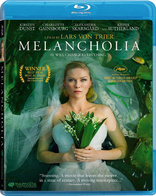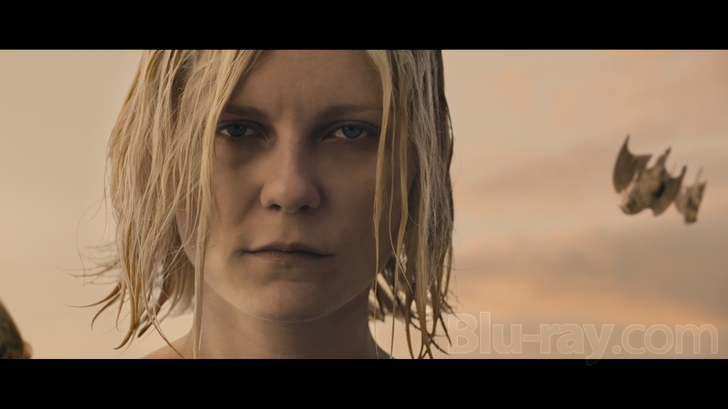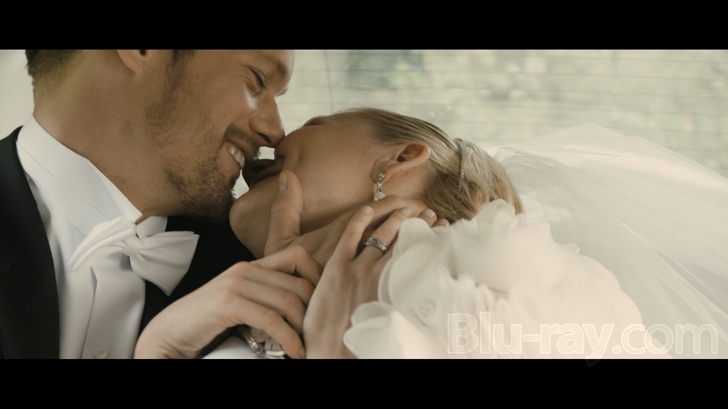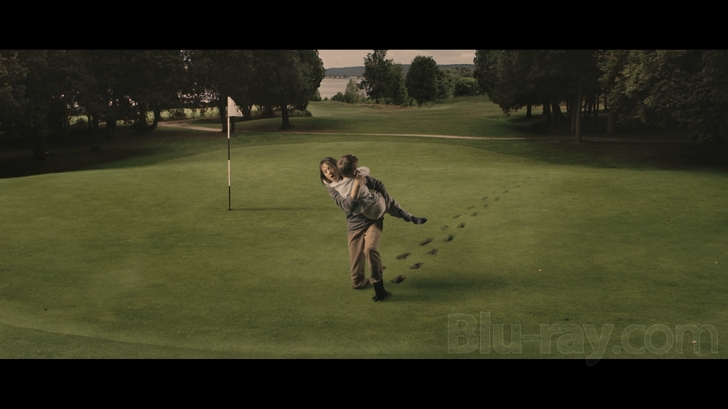Melancholia Blu-ray Movie
HomeMelancholia Blu-ray Movie 
Magnolia Pictures | 2011 | 135 min | Rated R | Mar 13, 2012
Movie rating
7.5 | / 10 |
Blu-ray rating
| Users | 3.6 | |
| Reviewer | 4.5 | |
| Overall | 4.0 |
Overview
Melancholia (2011)
Troubled sisters Justine and Claire find their already-strained relationship challenged as a mysterious new planet, Melancholia, threatens to collide with Earth.
Starring: Kirsten Dunst, Charlotte Gainsbourg, Alexander Skarsgård, Brady Corbet, Cameron SpurrDirector: Lars von Trier
| Drama | 100% |
| Sci-Fi | Insignificant |
Specifications
Video
Video codec: MPEG-4 AVC
Video resolution: 1080p
Aspect ratio: 2.35:1
Original aspect ratio: 2.39:1
Audio
English: DTS-HD Master Audio 5.1 (48kHz, 24-bit)
Subtitles
English SDH, Spanish
Discs
50GB Blu-ray Disc
Single disc (1 BD)
BD-Live
Playback
Region A (locked)
Review
Rating summary
| Movie | 5.0 | |
| Video | 5.0 | |
| Audio | 4.5 | |
| Extras | 3.0 | |
| Overall | 4.5 |
Melancholia Blu-ray Movie Review
Lars von Trier in ascendence.
Reviewed by Casey Broadwater March 8, 2012In 2011, two of the world's foremost directors of what we might call "serious" cinema--Terrence Malick and Lars von Trier--each delivered his own multi-layered, all-encompassing statement about the place of human life within the universe. Malick's The Tree of Life has a grand scope that guides us from the origins of the cosmos to the very end of time, in between honing in on a small-town, mid-20th-century Texan family to explore the dialectically conflicting concepts of "nature" and "grace." The film's intellectual core is ambiguous enough that I've heard it variously described as both an inherently Christian metaphor--a Job-like story of God's inexpressibly mysterious ways--and an essentially atheistic screed that sees humanity as a candle flickering in the endless black of an otherwise indifferent universe. There's no such ambiguity in Melancholia, Lars von Trier's morosely beautiful reflection on depression and existential nihilism. Not only does von Trier suggest that we're entirely alone, floating inconsequentially in space, he actually makes an uncomfortably convincing argument that life produces far more misery and evil than pleasure and goodness, and that it would be no great loss if all life vanished in a cataclysmic cosmic event that no one saw coming until it was too late.

"Life is only on Earth. And not for long."
At its most superficial, Melancholia belongs to the end-of-the-world movie genre, so let me get this out of the way at the start: the Earth and all life upon it do indeed come to a fiery end when the planet collides with the orbit of Melancholia, a rogue gas giant that has been hiding out of sight behind the sun. This is no spoiler. In fact, von Trier begins with the annihilation-of-all-that-is so we don't have to waste our time wondering until the end if it will or won't happen.
In a stunning opening overture--set to the prelude to Wagner's Tristan und Isolde--we're shown slow-motion glimpses of things to come, some from narrative reality and others from dreams: Dead birds fall from the sky. Arcs of electricity rise from telephone poles. Kirstin Dunst, in a wedding dress, tries to trudge through some kind of gray yarn that pulls at her legs, holding her back. A few shots later, she floats down a stream holding her bouquet, like John Everett Millais' portrait of Ophelia. This prologue sequence--which introduces the leitmotifs of depression and destruction--culminates with Earth being entirely subsumed within Melancholia. The beginning is The End. This is dramatically freeing, and immediately distances the film from pop apocalypses like Armageddon or Deep Impact. The sentiment and spectacle of the end of the world isn't the point. Like Tarkovsky with The Sacrifice--the film to which Melancholia is most clearly indebted--von Trier is far more interested in examining how his two lead characters, Justine (Dunst) and Claire (Charlotte Gainsbourg), react to their impending doom.
Part One, "Justine," opens at Justine's wedding reception, an incredibly posh affair hosted--and paid for--by her sister Claire's filthy rich husband, John (Kiefer Sutherland), who owns a castle with an adjoining golf course. The bride and her dimwitted, puppy-doggish new groom, Michael (Alexander Skarsgård), arrive several hours late to the party, which gets off to a choppy start and then spirals into a maelstrom of dysfunction. Justine's divorced parents are at odds; her father (John Hurt) attends the dinner with a much-younger woman on each arm, and when he goes to give his toast, Justine's mother (Charlotte Rampling) stands up and coldly proclaims that she hates marriages. Justine’s boss (Stellen Skarsgård) is a kill-joy too, hounding her--his star copywriter--to come up with a new slogan for his latest ad campaign. The bride herself spends most of the evening wandering off--she takes a bath when she should be mingling with guests, she absconds with a golf cart for an escapist trip down the fairway--and it becomes increasingly clear that she suffers from chronic, alienation-inducing depression. This wedding seems to be her last-effort grab at a "normal" life, but she can't hold on. The atmosphere of the reception turns sour and Justine's nascent marriage implodes. Ominously, a strange star holds sway in the night sky.
This first part is an all-out assault on pomp and circumstance, which Justine--and von Trier, I presume--finds utterly meaningless. Justine's mother, who retreats to her guest room, sums up the theme perfectly when John tries to fetch her back downstairs for the cutting of the cake: "When Justine took her first crap on the potty, I wasn't there. When she had her first sexual intercourse, I wasn't there. So give me a break, please, with all your f-- king rituals." There's a surprising amount of dark-as-the-void-of-space comedy here, from John's mounting exasperation--like when he asks, "Is all of your family stark raving mad?"--to the way that Justine's father toys with the manor's butler, pretending to lose one spoon after another at the dinner table. Playing against type, German actor Udo Kier also has a wryly funny bit part as a gay wedding planner who's so angry at Justine for ruining his event that whenever she walks by he puts his hand over his face, refusing to even look at her.
The comic relief disappears completely, however, in Part Two--"Claire"--which takes place an unspecified time after the botched wedding. Suffering a mental breakdown, Justine goes to stay at the manor with Claire, John, and their young son, Leo. By now, Melancholia has been discovered, and scientists calculate that in five days it will make a near-Earth flyby. As an amateur astronomer, John is almost giddy with excitement for the extremely narrow miss, but Claire--who's normally poised and reserved--grows frantic with apocalyptic anxiety, convinced the two planets will collide. I'll say no more about what follows, other than that the film offers a fascinating role reversal; as Claire basically freaks out, Justine becomes almost completely stoic, unperturbed by the thought of all life being suddenly extinguished. She even welcomes it: "The Earth is evil. We don't need to grieve for it."
Your own philosophical/religious outlook will of course determine how well von Trier's nihilism sits with you, but even setting this aside, the film works wonderfully as an extended metaphor for clinical depression and its emotionally, sometimes even physically crippling effects. It's well documented that von Trier himself suffers from depression--his inability to work apparently frequently halted the production of Antichrist--and the film's treatment of the subject matter carries a deeply personal authenticity. Justine very clearly is von Trier, in a sense, and Kirstin Dunst's portrayal is often chillingly exquisite--she's broken and hardened-over, easily distracted and painfully distanced from those around her.
In terms of filmmaking and storytelling, Melancholia is perhaps Lars von Trier's clearest, purest vision yet, a fluid synthesis of stately German Romanticism and the handheld, documentary-style jitteriness of his Dogme 95 days. And it's filled with small mysteries and oddities, making it worth repeatedly revisiting. I've seen the film three times now, and I keep noticing new layers to unpeel, like the use of Pieter Brueghel's painting "Hunters in the Snow," which also makes an appearance in Tarkovsky's Solaris. Or the scenes that harken esoterically back to Antichrist, like when Justine's horse, Abraham, refuses in terror to cross a footbridge. Or the visual and thematic symmetry of having Justine correlated with Melancholia, Leo with the Moon, and Claire with the sun. It's always the mark of a great film when it offers much more than you can unpack in a single viewing.
Melancholia Blu-ray Movie, Video Quality 

Gorgeous. Just gorgeous. I couldn't help but take screencaptures of every shot in the slow-motion opening prologue, which is easily one of the most visually striking sequences I saw in a film in 2011. (In this regard, Melancholia and Tree of Life once again go head-to- head.) I love the cinematography here. The elegant stillness of the slow-mo shots compared to the handheld jitteriness of the rest, the golden yellow color cast of Part One that gives way to appropriately somber blues in Part Two, the painterly tableaus and even the CGI shots of the rogue planet--it all looks stunning on Blu-ray, with a 1080p/AVC encode that's practically perfect. The film was shot digitally using Arri Alexa cameras and razor-sharp Zeiss prime lenses, and the level of clarity is consistently exceptional. Closeups, especially, are wonderfully crisp--facial details and clothing textures are finely resolved--and it's rare to see a soft or muddled-looking shot. (Since most of the film was shot handheld, focus does drift and shift, but that's another thing entirely.) The color grading is excellent too, and like I said before, the look of the film changes quite drastically between "Justine" and "Claire." In both sections, black levels are stable, contrast is tight without looking overcranked, and skin tones are natural. And while there's an expected level of source noise in some of the darker scenes--which is unavoidable--I didn't spot any compression problems or encode issues. I have no qualms giving this disc full marks.
Melancholia Blu-ray Movie, Audio Quality 

As it should be clear by now, Melancholia isn't your typical end-of-the-world sci-fi movie, and accordingly, doesn't feature your usual explosions- a-plenty end-of-the-world sci-fi action movie sound design. This is a largely quiet, conversational film, and its DTS-HD Master Audio 5.1 surround track on Blu-ray reflects that with a mix that's mostly focused on clean, balanced dialogue. That's not to say this track never delivers any moments of aural bliss. The use of music in the film is sublime. The prelude to Wagner's opera Tristan und Isolde is featured prominently, and the orchestral arrangement--especially if you like to have the volume on your receiver set relatively high--sounds breathtakingly rich and clear. The music is often bled subtly into the rear speakers, but otherwise the surround channels stay fairly reserved, host only to low-level ambience and a few isolated effects. It might be low on sonic theatrics, but I think this mix works almost perfectly for the film. The disc includes optional English SDH and Spanish subtitles, both of which appear in easy-to-read white lettering.
Melancholia Blu-ray Movie, Special Features and Extras 

Magnolia's U.S. release of the film loses a few of the special features from the British version--including some interviews, a documentary on the Danish New Wave, and, most sadly, the director's commentary--but the featurettes that are here are all well worth watching.
- About Melancholia (1080p, 12:00): Lars von Trier, Kirsten Dunst, Charlotte Gainsbourg, and psychologist Irene Oestrich discuss the film's themes.
- Special Effects (1080p, 7:02): A glimpse at some of the pre-visualizations, un-graded out-of-camera footage, and shots of the northern lights.
- The Visual Style (1080p, 10:11): Von Trier and his director of photography discuss their intentions for the look of the film.
- The Universe (1080p, 4:25): The film's visual effects supervisor and astrophysicist Michael J. Linden talk about the sciences behind the film.
- HDNet: A Look at Melancholia (1080i, 5:06): A typical HDNet promo, with a synopsis of the film and a few interview clips recycled from the featurettes above.
- Theatrical Trailer #1 (1080p, 2:14)
- Theatrical Trailer #2 (1080p, 2:09)
- Also from Magnolia Home Entertainment (1080p, 8:49)
Melancholia Blu-ray Movie, Overall Score and Recommendation 

An extended metaphor for the paralysis of depression and a grand existential statement about the ultimate inconsequentiality of life on Earth, Melancholia lives up to its name as the most lugubrious film of 2011. But it's also one of the best films of the year, artistically accomplished, gripping from start to finish, and beautifully performed. (Why Kirstin Dunst didn't get an Oscar nod for Best Actress is beyond me.) If you need any additional convincing that this is a must-buy release, know that the film looks fantastic on Blu-ray. Highly recommended!
Similar titles
Similar titles you might also like

Carmen
2003

Syrup
2013

Antichrist
2009

Take Shelter
2011

The Master
2012

The Informers
2008

Nymphomaniac: Volume II
2013

Nymphomaniac: Volume I
2013

An Invisible Sign
2010

Tell Me You Love Me
2007

Krisha
Signed Limited Edition to 100 Copies - SOLD OUT
2015

Interiors
1978

Sweetie
1989

A Woman Under the Influence
1974

Breaking the Waves
1996

A Dangerous Method
2011

Paris, Texas
1984

Beasts of the Southern Wild
2012

The Private Lives of Pippa Lee
2009

Bigger Than Life
1956